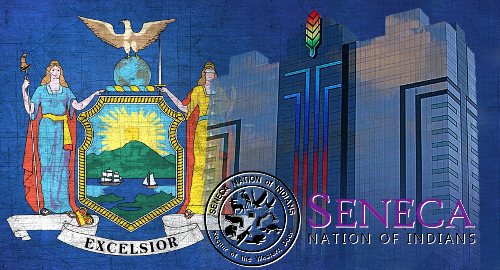 New York arbitrators have ruled that the Seneca Nation of Indians must resume paying the state a cut of slots revenue from its three tribal casino operations.
New York arbitrators have ruled that the Seneca Nation of Indians must resume paying the state a cut of slots revenue from its three tribal casino operations.
On Tuesday, a three-member arbitration panel voted 2-1 in favor of New York State, ruling that the Senecas were wrong to withhold the state’s 25% share of slots revenue from the tribal casinos in Buffalo, Niagara Falls and Salamanca.
In April 2017, the Senecas began withholding the payments, which previously amounted to around $110m per year. The Senecas claimed that their gaming compact with the state contained no language compelling the tribe to continue making the payments beyond the length of the compact’s 14-year initial term.
However, many observers suspected that the Senecas were more interested in expressing their displeasure with the state’s 2015 decision to issue new commercial casino licenses, including one to the del Lago Resort & Casino in Seneca county, just outside the Senecas’ “exclusive” casino territory. The del Lago opened two months before the Senecas announced their intention to stop its payments to the state.
The arbitration panel ruled that the tribe was obligated to continue making the payments to the state given that neither party objected to their compact’s automatic seven-year extension taking effect at the end of 2016.
The panel said the extension meant that the compact “continued on the same terms and conditions” of the initial term, and thus the tribe was “in breach” of its compact obligations by not sharing its slots revenue. The Senecas must now pay the state the estimated $200m the tribe has withheld since April 2017.
A senior advisor to Gov. Andrew Cuomo — who has an acrimonious history with the Senecas — told the Buffalo News that the state government was “thankful” for the panel’s ruling, noting that the casinos’ host communities, which depend on the revenue-sharing payments, “have been hurt by the Seneca Nation’s actions.”
The Senecas’ representative on the panel, former Bureau of Indian Affairs official Kevin Washburn, said the ruling “rewrites the compact in a way that harms [the Senecas] and provides an unjustified windfall to the state.”
The Senecas could appeal the arbitration panel’s ruling to federal court in Western New York. Seneca Nation president Rickey Armstrong Sr. said the tribe was still mulling its options, but insisted that “we are right on the law,” even if the courts “and apparently arbitration panels, do not always decide cases on the law, even their law.”